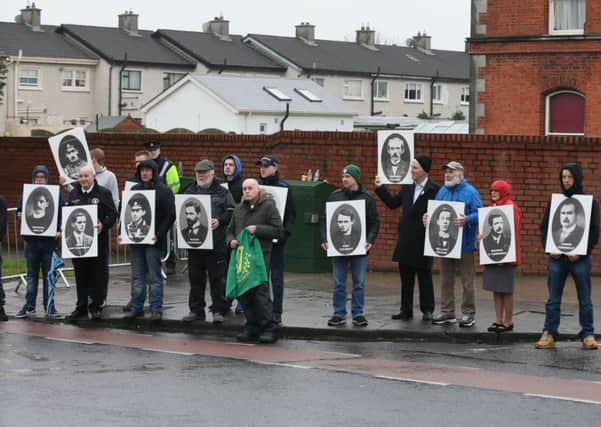Memorial to victims of 1916 Easter Rising unveiled in Glasnevin cemetery


Almost 500 people were killed in the uprising, the majority of them - 268 - were civilians caught up in the violence.
There has been some controversy about the inclusion of British soldiers on the “Necrology Wall” and a number of protesters gathered outside the historic cemetery in the north of the city to demonstrate as the interfaith service took place inside.
A significant Garda presence monitored the protest events.
Advertisement
Hide AdAdvertisement
Hide AdThe 488 names of those known to have died in the rising are listed in alphabetical order.
The names of 119 British soldiers, some of whom are buried in Glasnevin, are engraved on the reflective black granite stones.
The Glasnevin Trust has insisted the memorial is an attempt to present the historical facts, without hierarchy or judgment.
John Green, chairman of Glasnevin Trust, told the service the wall reflected modern Ireland.
Advertisement
Hide AdAdvertisement
Hide Ad“Behind each and everyone of these lost lives is a story of heartbreak, no matter what side the person served on or indeed for those innocently caught up in the conflict,” he said.
“One hundred years on we believe this memorial reflects the time we live in, with the overwhelming majority of the Irish people wishing to live in peace and in reconciliation.
“But it is for each visitor to take from the wall what they wish.”
Senior church figures from a range of faiths and humanist representatives were among those to speak at the ceremony.
Advertisement
Hide AdAdvertisement
Hide AdThe project has drawn inspiration from an international memorial near Arras in France that lists the names of 580,000 people killed in fighting on the western front in the First World War.
Acting Irish Taoiseach Enda Kenny attended Sunday morning’s service.
Mr Kenny laid a wreath after a number of local school children were invited to unveil the new memorial wall. A minute’s silence was observed before the last post was sounded and the Irish Tricolour raised from half to full mast.
The service concluded with the playing of the Irish national anthem, Amhran na bhFiann.